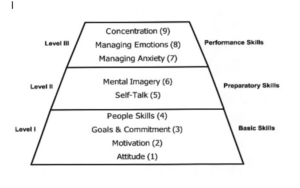To be a top athlete, you don’t have to be a pro player or an Olympic gold medalist. You also don’t need a trophy room, a state title, or to hit the front cover of the sports section. A twelve-year-old figure skater who hasn’t won a competition, a college golfer with a zero rating, a middle-aged sprinter who wants to run her debut marathon, a bodybuilder who owns multiple world records, and an Olympic winner are among the successful athletes I’ve worked with.
What such sportsmen have in connection is that their sport is valuable to them, and they are dedicated to becoming the finest they can be given the constraints of their circumstances – other obligations, resources, time, and natural talent. They establish lofty, attainable objectives for themselves and work hard in the gym and on the field. They are accomplished because they are dedicated to achieving their objectives while also enjoying their sport. Their athletic involvement enhances their life, and they think that the benefits they receive are worth the time and effort they put into it.
Read more: WHAT ARE THE MOST IMPORTANT FUNDAMENTAL SPORT SKILLS?
There are nine distinct mental skills that assist in athletic performance. They can all be acquired and enhanced with practice and coaching. We deal with committed athletes of all ages and abilities to help them acquire and improve these crucial skills.
We feel that our efforts are important since the same mental abilities that athletes utilize to succeed in sports can also be applied to other aspects of their lives.
A Brief List of the Nine Mental Skills
Successful Athletes:
Make a conscious effort to keep a positive outlook.
Maintain a strong degree of motivation.
Set a high bar while remaining realistic.
Deal with people in an efficient manner.
Make positive self-talk a habit.
Use optimistic imagery in mind.
Effectively manage anxiety.
Properly manage emotions.
Maintain focus.
Mental Skills Training
These nine cognitive skills are required for successful functioning in both sports and non-sport settings.
These talents can be acquired and developed via education and practice. Such as these examples:
Start working with each athlete by evaluating his present ability level in each of the skills.
Devise a strategy for teaching and developing the specific abilities that the individual requires.
In order to measure success, examine the player’s competence in each of the competencies on a regular basis.
Read more: 8 LESSONS PARENTS CAN TEACH KIDS PARTICIPATING IN YOUTH SPORTS
The Performance Pyramid
While each of the nine competencies are vital, they are most important at one of three phases: long-term growth, immediate performance planning, and the performance itself.
Level 1 – These mental abilities provide a solid foundation for achieving long-term objectives, learning, and practicing on a regular basis. They are required on a daily basis for extended periods of time, frequently months or years.
Level 2 – These abilities are needed to prepare for a performance right before it. They might be utilized right before a tournament or right before a specific performance activity, such as a soccer penalty or a basketball free throw.
Level 3 – These abilities are put to use in real-life situations.
The relationships between the nine talents are depicted in the pyramid below. Each of the higher levels builds on and combines the abilities learned in the previous levels.

